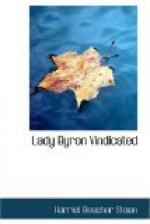Lady Byron’s married life—alas! it is lived over in many a cottage and tenement-house, with no understanding on either side of the cause of the woeful misery.
Dr. Winslow truly says, ’The science of these brain-affections is yet in its infancy in England.’ At that time, it had not even begun to be. Madness was a fixed point; and the inquiries into it had no nicety. Its treatment, if established, had no redeeming power. Insanity simply locked a man up as a dangerous being; and the very suggestion of it, therefore, was resented as an injury.
A most peculiar and affecting feature of that form of brain disease which hurries its victim, as by an overpowering mania, into crime, is, that often the moral faculties and the affections remain to a degree unimpaired, and protest with all their strength against the outrage. Hence come conflicts and agonies of remorse proportioned to the strength of the moral nature. Byron, more than any other one writer, may be called the poet of remorse. His passionate pictures of this feeling seem to give new power to the English language:—
’There is a war, a chaos of
the mind,
When all its elements convulsed—combined,
Lie dark and jarring with perturbed
force,
And gnashing with impenitent remorse,
That juggling fiend, who never spake
before,
But cries, “I warned thee!”
when the deed is o’er.’
It was this remorse that formed the only redeeming feature of the case. Its eloquence, its agonies, won from all hearts the interest that we give to a powerful nature in a state of danger and ruin; and it may be hoped that this feeling, which tempers the stern justice of human judgments, may prove only a faint image of the wider charity of Him whose thoughts are as far above ours as the heaven is above the earth.
CHAPTER VII. HOW COULD SHE LOVE HIM?
It has seemed, to some, wholly inconsistent, that Lady Byron, if this story were true, could retain any kindly feeling for Lord Byron, or any tenderness for his memory; that the profession implied a certain hypocrisy: but, in this sad review, we may see how the woman who once had loved him, might, in spite of every wrong he had heaped upon her, still have looked on this awful wreck and ruin chiefly with pity. While she stood afar, and refused to justify or join in the polluted idolatry which defended his vices, there is evidence in her writings that her mind often went back mournfully, as a mother’s would, to the early days when he might have been saved.
One of her letters in Robinson’s Memoirs, in regard to his religious opinions, shows with what intense earnestness she dwelt upon the unhappy influences of his childhood and youth, and those early theologies which led him to regard himself as one of the reprobate. She says,—




